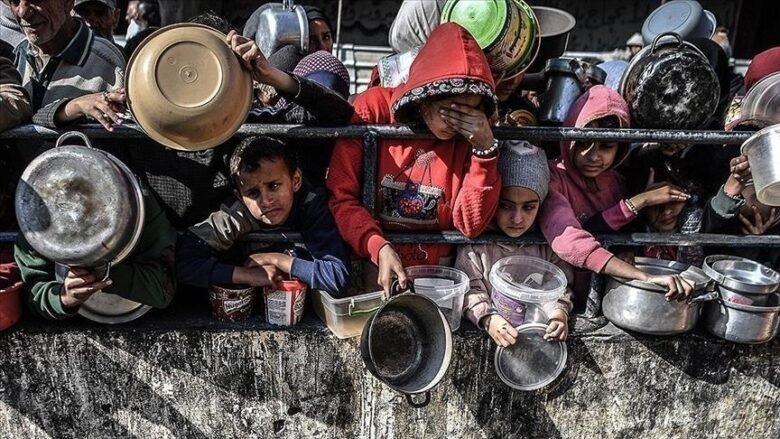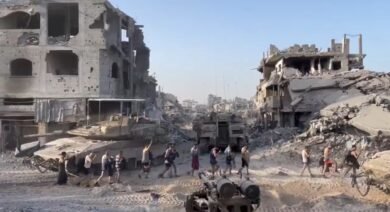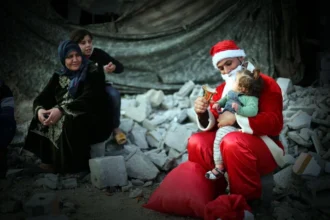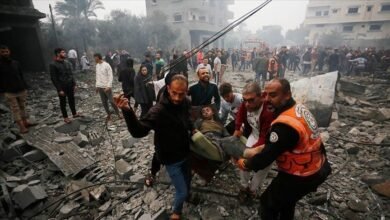
ICSPP issues an urgent appeal to the United Nations and the international community to open humanitarian corridors into the Gaza Strip and to end the systematic starvation policy
Date: July 14, 2025
Humanitarian Appeal
(ICSPR) issues an urgent appeal to the United Nations and the international community to open humanitarian corridors into the Gaza Strip and to end the systematic starvation policy
In light of the unprecedented humanitarian catastrophe in the Gaza Strip, the International Commission to Support Palestinians’ Rights (ICSPR) has issued an urgent international appeal to a number of international and regional organizations and bodies, calling for immediate and urgent intervention to open safe and permanent humanitarian corridors to the Gaza Strip, to stop what it described as “genocide” being committed against Palestinian civilians as a result of the suffocating blockade and the systematic starvation policy pursued by the Israeli occupation authorities since the beginning of the aggression in March.
ICSPR directed its appeal to: the Secretary-General of the United Nations, the United Nations Special Envoy, the President of the Human Rights Council, the United Nations High Commissioner for Human Rights, the Prosecutor of the International Criminal Court, the UN Special Rapporteurs concerned with human rights in the occupied Palestinian territories, the right to food, and the right to health, in addition to the League of Arab States, the Office for the Coordination of Humanitarian Affairs (OCHA), the International Committee of the Red Cross, the World Health Organization, the European Union, the African Union, and the High Contracting Parties to the Geneva Conventions.
In its letter, the Commission confirmed that the Gaza Strip has been under a complete blockade for four months, during which all border crossings were closed—especially the Rafah crossing from the Egyptian side, and the Kerem Shalom crossing from the Israeli side—which has led to the complete isolation of the Strip from the outside world, and prevented the entry of humanitarian aid, medical supplies, fuel, and other necessities, in blatant violation of international humanitarian law and the Geneva Conventions.
Total Collapse of the Humanitarian Situation
According to the appeal, the Gaza Strip is now experiencing a “total collapse” in all sectors, particularly food and health security. More than 90% of Gaza’s population suffers from severe food insecurity, while around 576,000 people have entered a stage of full famine, and 247 patients and 67 children have died from hunger and severe malnutrition.
The Commission also indicated that more than 335,000 children are at risk of slow death, according to UNICEF reports, amid the spread of famine and serious diseases such as anemia, night blindness, and rickets, while indicators confirm that 100% of children under the age of five suffer from anemia.
Pregnant and nursing women—more than 16,500—are facing the risk of famine and malnutrition, while more than 60,000 children suffer from chronic illnesses, and 7,700 infants are at risk of death due to the lack of infant formula.
Deliberate Targeting of Humanitarian Infrastructure
The Commission highlighted what it described as the “systematic destruction” of humanitarian infrastructure. A total of 28 charitable kitchens, 37 aid distribution centers, and 16 bakeries were bombed, which deprived 85% of Gaza’s population of their primary food sources, especially as all bakeries ceased operation. In addition, 95% of water sources were destroyed, depriving the population of access to potable drinking water.
The violations extended beyond blocking aid, to include direct targeting of civilians while they were receiving aid in front of the American-Israeli aid points “Gaza Humanitarian Foundation”, which resulted in the killing of 815 civilian martyrs and the injury of 5,252 others, with 42 missing persons.
More than 160 headquarters of humanitarian organizations were targeted by shelling or forced evacuation orders, in addition to restrictions imposed on the work of humanitarian organizations and NGOs, such as requiring security coordination and the submission of staff lists.
In this context, ICSPR affirms that what has been declared by EU representatives regarding the opening of crossings and the entry of aid and goods into Gaza by the Israeli occupation remains in the realm of unfulfilled promises. The Israeli occupation continues to procrastinate and only allows very limited numbers of trucks to enter, irregularly and without daily consistency, which does not meet the population’s minimum essential needs.
“Famine continues to spread in the Strip, claiming the lives of the most vulnerable groups, including patients, children, and women—particularly pregnant and breastfeeding women.”
Collapse of the Health and Living Sectors
ICSPR also confirmed the collapse of the health sector, with 38 hospitals completely destroyed. The remaining hospitals operate at less than 10% of their capacity and lack fuel, medical equipment, antibiotics, and medications for chronic diseases such as cancer, diabetes, heart disease, and kidney disease.
The ban on fuel entry has caused generators to stop functioning, resulting in the death of dozens of patients in intensive care units and operating rooms. Patients have also been denied access to treatment abroad, despite more than 22,000 needing urgent care, including 13,000 who have completed referral procedures.
The Commission also noted the near-total collapse of the economic movement, with factories, agriculture, and small businesses shutting down, leading to an unprecedented rise in poverty and unemployment rates. The prices of food and vegetables have soared beyond the purchasing power of citizens, amid an almost complete lack of food, water, and hygiene materials.
Demands: Urgent Intervention and International Accountability
In conclusion to its appeal, the International Commission to Support Palestinians’ Rights (ICSPR) affirmed that what is happening in the Gaza Strip amounts to genocide, in accordance with the 1948 Genocide Convention, and a war crime under Article 8 of the Rome Statute, and in violation of international humanitarian law, the measures of the International Court of Justice, and the relevant UN resolutions.
ICSPR called on the international community to take the following immediate steps:
-
Urgent action to stop the genocide and the collective starvation policy, and to open safe and permanent humanitarian corridors without political conditions or security restrictions.
-
Full reopening of the Rafah and Kerem Shalom crossings, and ensuring the flow of aid including food, medicine, fuel, and water.
-
Ensuring the operation of international humanitarian organizations and providing international protection for relief convoys, civilians, and medical and humanitarian teams inside the Strip.
-
Cancellation of the criminal American-Israeli aid distribution mechanism, holding those responsible accountable, and ensuring that the occupation does not interfere in the distribution of humanitarian aid.
-
Calling on the UN Security Council and the United Nations to provide international protection for civilians.
-
Launching an international investigation into the violations that led to the deaths of civilians and the denial of food and medical care, and supporting the work of the International Criminal Court to prosecute those responsible for war crimes in Gaza.





